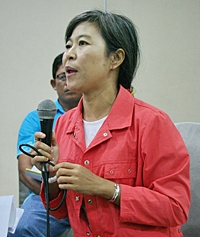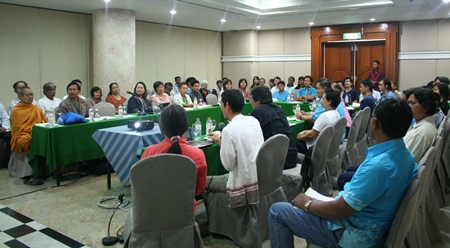More than 40 groups from five Eastern Seaboard provinces have joined forces to oppose industrial growth and push the region back toward a natural environment.
The Eastern Environmental Group convened its first meeting June 2 at Pattaya’s Long Beach Garden Hotel & Spa, bringing together 44 organizations including the Naklua Bay Preservation Group, Banglamung Bay Preservation Group, Laem Chabang Pier-Construction Opposition Group, Rao Rak Khao Chamao of Rayong, Srakaew Agri-Nature Foundation and the Special Agricultural Network’s Sustainable Water Development project. Officials from the National Public Health Office, and Community Development Institute also attended.
 Rao Rak Khao Chamao representative Bupphathip Chaemnil is part of one group trying to stop progress on the Eastern Seaboard.
Rao Rak Khao Chamao representative Bupphathip Chaemnil is part of one group trying to stop progress on the Eastern Seaboard.
Rao Rak Khao Chamao representative Bupphathip Chaemnil said the meeting was aimed at setting a shared vision and direction to push Thailand’s eastern region back toward a natural environment. Groups offered suggestions and helped set targets for how to jointly oppose expansion of industrial projects and restore the environment.
Examples of projects the EEG opposes include expansion of Laem Chabang Port, environmental protection near the Maptaput Industrial Estate and all phases of water purification, from hard water to residential distribution.
“From the study of the future condition of the Eastern Region, there will be problems that will affect the environment, including laying of new infrastructure and a doubling in the size of the industrial sector that will proceed like a chain reaction,” Bupphathip said.
Other areas of concern include changes in ownership for agricultural lands, with Bupphathip claiming that 80 percent of farmland in Phae, Rayong is now owned by foreigners. She claims these non-Thai owners will ruin things for residents by using the land for new non-agricultural investments.
“Based on this, it has become necessary for us to join hands to find measures to change the eastern region back towards nature,” she said.





